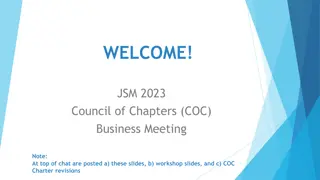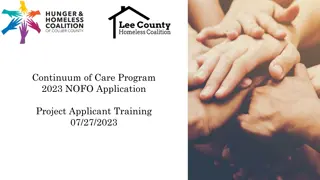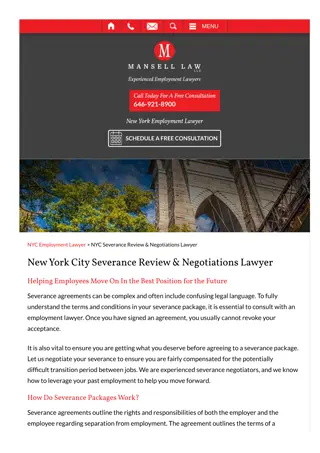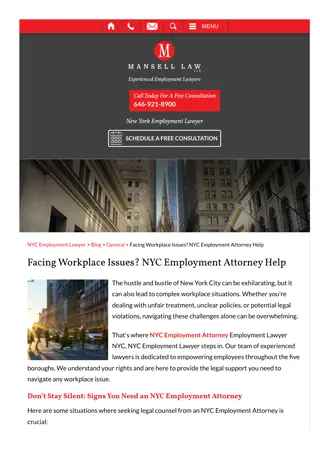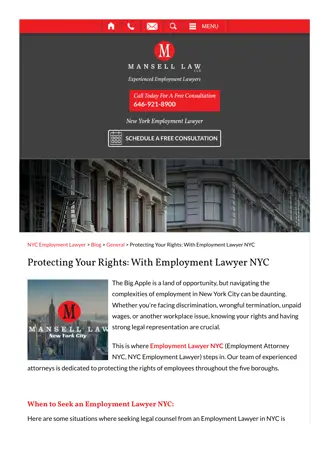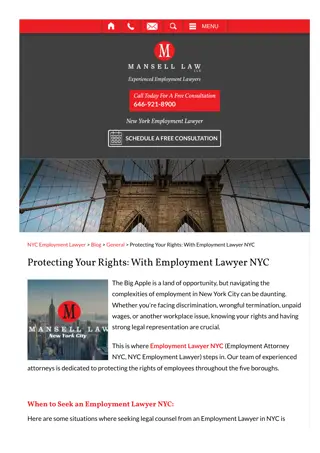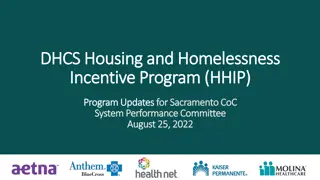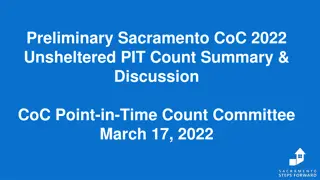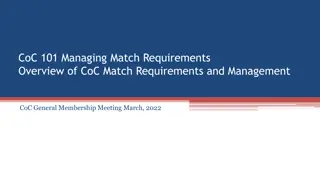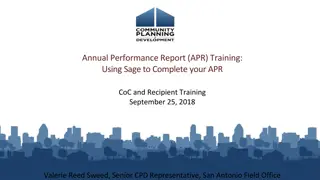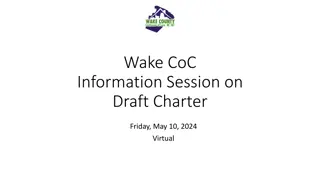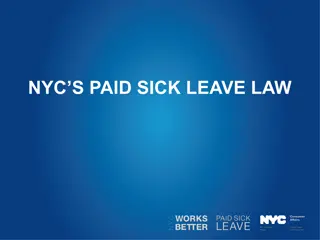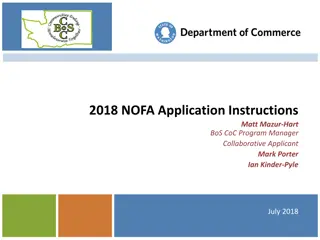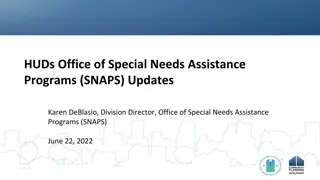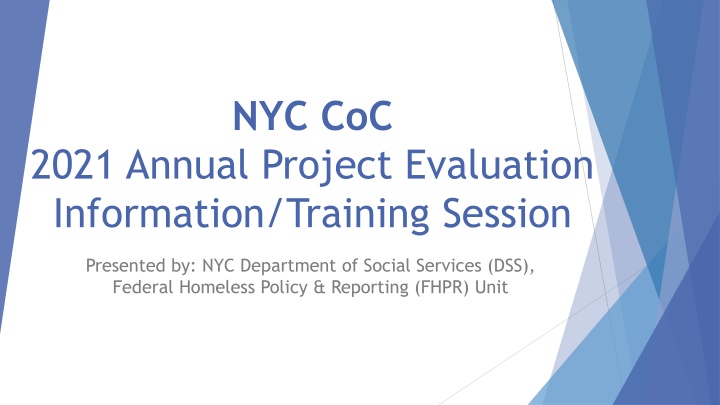
NYC CoC 2021 Annual Project Evaluation Information & Training
Learn about the NYC CoC 2021 Annual Project Evaluation process presented by NYC Department of Social Services and Federal Homeless Policy & Reporting Unit. Explore the timeline, COVID-19 impacts, tips for completing the evaluation, and more. Stay informed and engaged in the evaluation activities for enhanced performance management.
Download Presentation

Please find below an Image/Link to download the presentation.
The content on the website is provided AS IS for your information and personal use only. It may not be sold, licensed, or shared on other websites without obtaining consent from the author. If you encounter any issues during the download, it is possible that the publisher has removed the file from their server.
You are allowed to download the files provided on this website for personal or commercial use, subject to the condition that they are used lawfully. All files are the property of their respective owners.
The content on the website is provided AS IS for your information and personal use only. It may not be sold, licensed, or shared on other websites without obtaining consent from the author.
E N D
Presentation Transcript
NYC CoC 2021 Annual Project Evaluation Information/Training Session Presented by: NYC Department of Social Services (DSS), Federal Homeless Policy & Reporting (FHPR) Unit
Table of Contents Introduction/Background I. Review of Timeline II. 2021 CoC Evaluation III. Similarities/What s the Same What s New COVID-19 Appeals IV. Tips for Completing the Evaluation V. Contacts VI. VII. Questions
I. Introduction/Background Each year, HUD releases the Notice of Funding Availability (NOFA) that details application funding requirements. One requirement of the NOFA is that each application evaluate and rank programs. In 2012, the CoC voted to align the Evaluation Tool to HUD standards in order to maximize the CoC ranking nationally. Annually, the Evaluation Tool and NYC Local Priorities Survey is reviewed and updated by the Evaluation Workgroup and Performance Management Committee based on: Current HUD priorities and standards Lessons Learned from the prior year Evaluation on how to improve the Tool & Survey for user friendliness, relevance, question clarity, and performance measurement For the 2021 Evaluation, the CoC made significant enhancements to the HMIS Tool & Survey to make the Evaluation process easier and more transparent, and scoring more precise
II. 2021 Evaluation Activity Timeline Activity Milestone Date Spring-Summer 2020 Summer-Fall 2020 10/21-11/6 Early November 10/30/20 11/6/20 11/6/20 11/9/20 Updates and Enahncements to PH-TH HMIS Tool; Creation of New RRH HMIS Tool Updates and Enahncements to NYC CoC Local Priorities Survey Performance Management Committee & Evaluation Workgroup Testing of PH-TH HMIS Tool RRH Provider Testing of RRH HMIS Tool Steering Committee to approve Local Priorities Survey, motion to exempt 3 TH-RRH projects Notify projects being audited Evaluation Information Webinar EVALUATION KICK-OFF PART I: NYC CoC LOCAL PRIORITIES SURVEY ONLY (ALL PROJECTS) and PH-TH HMIS Tool Office Hours - for Providers with questions about Survey & HMIS Tool: Conference Line 929-221-0010; 6183 Week of 11/9 Monday, Nov. 9th: 11am-Noon; Tuesday, Nov. 10th: 3:30-4:30pm; Thursday, Nov. 12th: 9:30-10:30am; Friday, Nov. 13th: 1-2pm NYC CoC PERFORMANCE MANAGEMENT COMMITTEE - UPDATE NYC CoC LOCAL PRIORITIES SURVEY DUE IN SurveyMonkey PRELIMINARY RESULTS (1st Round) POSTED TO NYC CoC WEBSITE Preliminary Results Breakdown (Survey) sent to Providers DEBRIEF CALL ON PRELIMINARY RESULTS Data Adjustment Period and Audit Begins NYC CoC PERFORMANCE MANAGEMENT COMMITTEE: COVID-19 Impact on Evaluation Scores Data Adjustment Period and Audit Ends UPDATED (2nd Round) PRELIMINARY RESULTS POSTED TO NYC CoC WEBSITE Updated Preliminary Results Breakdown (Survey) sent to Providers DEBRIEF CALL ON UPDATED (2nd Round) PRELIMINARY RESULTS NYC CoC PERFORMANCE MANAGEMENT COMMITTEE: COVID-19 Impact on Evaluation Scores APPEALS SUBMISSION Period APPEALS COMMITTEE MEETS (IF NECESSARY) FINAL ADJUSTMENTS TO SCORES BASED ON COVID-19 PANDEMIC NYC CoC PERFORMANCE MANAGEMENT COMMITTEE: Final Review of COVID-19 Impact on Evaluation Scores FINAL EVALUATION RESULTS POSTED TO WEBSITE 11/20/20 11/23/20 12/11/20 12/11/20 12/11/20 12/11/20 12/18/20 12/24/20 1/15/21 1/15/21 1/15/21 1/15/21 1/15 -1/29 Week of 2/1 Week of 2/15 2/19/21 2/26/21 Final Results Breakdown (Survey) sent to Providers 2/26/21
III. 2021 CoC Evaluation Similarities to last year: What has remained the same The PH-TH HMIS Tool has functionally remained the same, but there have been several scoring and question enhancements to this year s Tool to allow greater consistency, precision, and transparency. These are covered in the NYC CoC 2021 Evaluation Tool & Survey Update Summary document. The PH-TH HMIS Tool can be accessed through the HMIS Data Warehouse (nychmis.footholdtechnology.com; Administration Fiscal - NYC CoC Evaluation Tool.) Contact Roxanna Deleon (deleonr@@dss.nyc.gov) if you need a User ID and/or Password. Additional details on how to use the Automated HMIS Tool are included in Section IX of the Evaluation Instructions document. The HMIS Tool enables projects to directly check the points they will receive on the HMIS-sourced metrics of the Evaluation. Providers should use this report as a self-monitoring tool throughout the year not just during the Evaluation period - and it is recommended that it be reviewed on a quarterly basis at minimum. It is also a way to double-check what is in HMIS - Providers and DSS can view the same data. Data is being reviewed directly from the HMIS Data Warehouse The NYC CoC Local Priority Survey, which addresses qualitative performance metrics, is also completed by all Projects DV Projects complete a separate DV Survey that captures the same quantitative metrics in HMIS Scores are not curved There will be a formal appeals process to resolve scoring disputes.
III. 2021 CoC Evaluation What s New? Please see NYC CoC 2021 Evaluation Tool & Survey Update Summary for details on all changes listed below New RRH HMIS Tool PH-TH HMIS Tool has been streamlined and clarified: Consistency in rounding across all questions points and more precise point ranges incorporated for each question Question 1: Average Daily Utilization over the course of the calendar year Question 3: Only Literal Homelessness admissions after January 4th, 2012 counted Gained/Increased Total income (Earned income and/or Other income) question combined
III. 2021 CoC Evaluation What s New? The 2021 Local Priorities Survey also has some changes: Minor changes to instructional language that more clearly explains what is expected and required to complete the Survey 20 maximum points (22 maximum points last year) Consistency in rounding across all questions RRH Projects no longer exempt from SOAR question SOAR question updated PWLE questions streamlined for greater clarity and to focus on core issues CAPS/Coordinated Entry questions removed
III. 2021 CoC Evaluation What s New? The 2021 Local Priorities Survey also has some changes: Removal of three (3) point deduction question on mandatory HMIS training Removal of three (3) point deduction question on mandatory Environmental Review training Inclusion of extra credit question for 2020 Youth Count or HOPE Count participation Inclusion of two (2) unscored questions for RRH projects Question on Administrative Spend-Down (1 point) removed Question on Total Spend-Down now worth nine (9) points instead of eight (8) points Question on compliance with several HUD and CoC policies remain but are now un-scored. Two new areas of compliance included, but also un-scored
III. 2021 CoC Evaluation What about COVID-19? There will not be bonus questions around the COVID-19 pandemic as was originally proposed during the Evaluation Workgroup session a few months ago. The CoC will be making a determination about the affect the COVID-19 Pandemic had on project performance on the Evaluation. We will communicate those decisions in due time. Please be patient. If an organization contends that their project was more affected by the Pandemic than recognized by the CoC, the Appeals process will likely be the mechanism by which projects can articulate any such arguments.
IV. Appeals Over the past three years, we have seen that most appeals are really requests for data adjustment. The examples below demonstrate the difference. Example 1: Your project did not receive the full points for Q1. Utilization on the HMIS Tool for its Preliminary Score. Data adjustment. Double-check your project set up in the HMIS Datawarehouse and the completeness and accuracy of your data. Example 2: There was an offline unit in July 2020 as a result of a fire and NYPD will not let you rent out the unit. Your project did not receive the full points for Q1. Utilization on the HMIS Tool for its Preliminary Score. If you notified the CoC as soon as possible, and have supporting documentation/correspondence, this is a Data Adjustment issue. Since Utilization is based on an average daily capacity over the course of the year, the project may also have not lost as many points as it would have previously when the measure was based on 4 point-in-time counts. Example 3: Your project did not receive the full 15 points for Q1. Utilization on the HMIS Tool for its Preliminary Score. Your building was undergoing a minor renovation starting in March 2020, resulting in 3 units being taken offline. You did not notify the CoC because the renovation was going to be completed by April 1st and you anticipated renting up those 3 units immediately thereafter. The renovation was not completed until May 1st and so your project lost more points than you anticipated. You feel that in this particular case, because your utilization has consistently been 100% for several years and this was just an off year /contractor delays were out of your control, that your project should either be exempted (i.e. given full credit). Appeal
IV. Appeals Over the past three years, we have seen that most appeals are really requests for data adjustment. The examples below demonstrate the difference. Example 4: Your project consistently scores poorly on the Q.8 Spend-Down on the Local Priorities Survey because of restrictions around tenant contributions to rent and fluctuating tenant income. Data Adjustment or Appeal? Appeal Example 5: Your project still scored poorly on the new combined question on Increase in Income (Earned Income and Other Income) because your clients are not eligible for Other Income as a result of exceeding the income cap. The CoC hopes that the new combined-question will result in better project scores on this question. If not, submit an Appeal. Example 6: Your project scored lower on certain questions, HMIS or Survey, due to the COVID-19 Pandemic, in your estimation. The CoC will release guidance on this issue during the Evaluation once Preliminary Results and Updated Results are reviewed. The Appeals Committee will also review all COVID-19 based requests and determine an appropriate course of action. Accurately complete the Appeals Form on p.39 of the 2021 Evaluation Instructions. Incomplete information, inaccurate information, and late submission could result in disqualification.
V. Tips for Completing the Evaluation General The DSS Team will be strict about adhering to deadlines this year. Material that comes in post deadline will not be reviewed. ONLY SUBMIT MATERIALS WITHIN EACH PHASE OF THE EVALUATION. FOR EXAMPLE, SUBMIT DATA ADJUSTMENT MATERIALS FROM 12/11/20 12/24/20, NOT BEFORE IT WILL NOT BE REVIEWED. IF YOUR PROJECT IS BEING AUDITED, YOU MAY SUBMIT THE ADDITIONAL DOCUMENTATION WITH YOUR ORIGINAL SURVEY DUE BY THE 11/23 DEADLINE. IF YOU NEED MORE TIME TO COMPILE THESE DOCUMENTS, YOU CAN SUBMIT A 2ND SURVEY WITH ALL OF THE DOCUMENTATION BY THE 12/24/20 DEADLINE. Audited projects must submit documentation demonstrating their compliance with the following: NYC Local Priorities Survey Part 3: Policy Section Question 2: Environmental Review Question 3: Fair Housing Act/Equal Access Policy, VAWA, LGBTQI Policy, ESSA (projects not serving children are exempt), NYC CoC Written Standards, HUD Housing Quality Inspections
V. Tips for Completing the Evaluation HMIS Tool Accurate and complete data. Clean up your data as much as possible before and after you run the HMIS Tool. Do not wait for the Data Adjustment Period! DSS runs the HMIS Tool three times for Preliminary Results, Updated Results, and Final Results. According to the Timeline on Slide 4, that gives you almost 3 full months to whip your HMIS data in to shape. Download the paper MS Excel version of the Tool and have it by your side when you run the Tool it provides the full point-spread for each question. Local Priorities Survey The Survey cannot be saved in SurveyMonkey. Therefore you should plan on completing it in a single sitting. Download the paper version of the Survey and record your answers there before or while completing the Survey in SurveyMonkey. You will then have a copy of your responses, and can hone in on what you may want to change during the Data Adjustment Period. It also helps if you cannot complete the Survey in a single sitting when you return to it you can quickly enter your responses. Adjustments to Survey responses must be submitted by the end of the Data Adjustment Period. If you manage to spend-down all or more of your grant after the end of the Data Adjustment Period, you could submit an Appeal indicating as such. The DSS Team will check in SAGE and LOCCS and if we concur, you will receive additional points. The same can be said for SOAR documentation and PWLE documentation. SUBMIT ONLY ONE (1) SURVEY BY THE 11/23/20 DEADLINE. ADDITIONAL SURVEYS WILL NOT BE REVIEWED. IF CHOOSING TO DO SO, SUBMIT ONLY ONE (1) SURVEY BY THE 12/24/20 DATA ADJUSTMENT DEADLINE. ADDITIONAL SURVEYS WILL NOT BE REVIEWED.
V. Tips for Completing the Evaluation Office Hours We will hold open Office Hours the week of November 9th where you can call in and ask questions about the Evaluation and receive answers. Conference Call #: 929-221-0010; Passcode: 6183# Monday, November 9th: 11am-Noon Tuesday, November 10th: 3:30-4:30pm Thursday, November 12th: 9:30-10:30am Friday, November 13th: 1-2pm
V. Contacts NYC CCoC team email: nycccoc@dss.nyc.gov Charlie Winkler, Deputy Director, Federal Homeless Policy & Reporting Unit, NYC DSS Email: winklerc@dss.nyc.gov Merih Anil, Project Monitoring Analyst, Federal Homeless Policy & Reporting Unit, NYC DSS Email: anilm@dss.nyc.gov Cadija Tibbs, Senior Administrative Analyst, Federal Homeless Policy & Reporting Unit, NYC DSS Email: tibbsca@dss.nyc.gov
VI. Questions Please see the following documents: NYC CoC 2021 Evaluation Instructions NYC CoC 2021 Evaluation: Answers to FAQs NYC CoC 2021 Evaluation Tool & Survey Update Summary NYC CoC 2021 Evaluation PH-TH HMIS Tool NYC CoC 2021 Evaluation RRH HMIS Tool NYC CoC 2021 Evaluation Local Priorities Survey NYC CoC 2021 Evaluation Domestic Violence Evaluation

